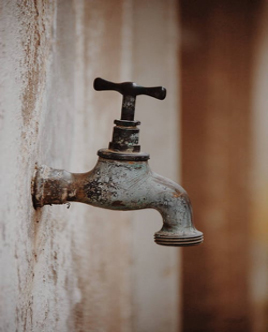Ships, bridges, pipelines—most metallic structures are prone to corrosion. Learn about the importance of corrosion prevention.
The public relies on many metallic structures. Ships transport essential goods and allow us to travel. Pipelines fuel our homes and businesses. Treatment plants provide us with clean water.
Ships help our world function. These impressive structures require many logistical considerations (including corrosion control).
However, corrosion has the potential to destroy these essential structures, delaying commerce throughout the world and making infrastructure unsafe to occupy.
That’s why it’s every business’s responsibility to take corrosion prevention seriously to stop these structures from rusting away. If they don’t, they will face expensive repairs and even put the public at risk.
Here, we’ll tell you the importance of corrosion prevention and how businesses can protect their structures from rust.
Corrosion is a natural process. It refers to the act of metals reverting to their natural “ore-like” state under the action of water and oxygen. The most common example of this type of degradation is the rusting of steel.
For corrosion to occur, two dissimilar metals need to be submerged in soil, concrete, water, or some other electrolytic substance.
The electrolyte allows the more active metal (anode) to release free electrons, thus oxidizing the metal. The less active metal (cathode) accepts the electrons. This process prevents the cathode from rusting. However, the process reduces oxygen at the cathode and triggers a reaction with the oxidized metal. As a result, the anode will form metal oxide (AKA rust).
Pure water isn’t a suitable electrolyte. However, water tends to contain minerals, contaminants, etc. These substances allow water to conduct electrons, making it a suitable electrolyte. Saltwater is particularly notorious for causing rust as it has a high concentration of contaminants.

Rust is a natural process. You see examples of it in your daily life. Luckily for businesses, there are ways to slow it down.
We know that the anode is the metal that suffers from corrosion. So, to implement corrosion control, we need to turn the metal we’re trying to protect into the cathode.
Enter corrosion prevention (AKA cathodic protection). Cathodic protection converts active areas of metals to passive surfaces.
Cathodic protection companies rely on two main methods to protect metals:
Sacrificial Anode Cathodic Protection
This method involves connecting the metal to be protected to a more active metal. The more active metal becomes the new anode. By giving up its electrons, the sacrificial anode protects the cathode from rusting.
Impressed Current Cathodic Protection (ICCP)
This method uses a control panel to polarize the metal to be protected. The control panel uses a regulated DC power supply to provide an external source of electrical power.
Each of these methods has its pros and cons. For instance, sacrificial anodes don’t use as much energy but need to be located in a specific manner. ICCP systems use a lot of energy but tend to be more efficient.
With the help of a cathodic protection company, businesses can choose the method best suited for their needs and budgets.
Cathodic protection is important for many industries. Engineers use it to protect the integrity of bridges, pipelines, ships, offshore floaters, and other metal structures.
While corrosion control methods can be used on different types of metals, it is most commonly used for preserving steel.
Initial installation of cathodic protection is expensive, not to mention routine inspections and maintenance.
This can deter many businesses from implementing it. However, proper cathodic protection is well worth the cost. A couple of the many benefits include:
It Helps Lengthen a Structure’s Lifespan
All metal structures are doomed to rust away. By implementing corrosion control, you put off the inevitable for as long as possible. This lengthens the structure’s lifespan and deters the need for expensive repairs and replacements.
It Ensures a Structure Functions Properly
It is crucial for structures like bridges, ships, and pipelines to function properly. If they don’t, it can hinder a business’s operations and even cause harm to others.
Rust can inhibit normal function. It can weaken structures, cause electrical issues, and lead to other issues. Corrosion control prevents rust and ensures a structure functions as it should.
Corrosion control is a serious concern for businesses that rely on metals. It keeps our bridges, pipelines, and other fundamental structures working properly.
With the right anti-corrosion methods, every business can cut down on costs and ensure customer safety.
In this episode, I sat down with Beejan Giga, Director | Partner and Caleb Emerson, Senior Results Manager at Carpedia International. We discussed the insights behind their recent Industry Today article, “Thinking Three Moves Ahead” and together we explored how manufacturers can plan more strategically, align with their suppliers, and build the operational discipline needed to support intentional, sustainable growth. It was a conversation packed with practical perspectives on navigating a fast-changing industry landscape.